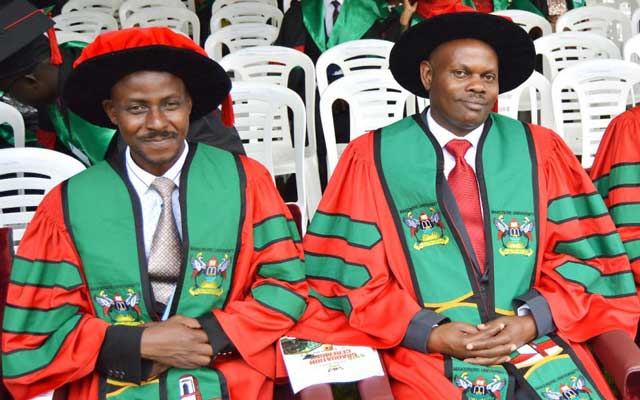
Kampala, Uganda | THE INDEPENDENT | Dr Isaac Mugume, a Meteorology PhD graduate has benefitted from a 9.4 billion shillings innovative initiative supporting Africa-led climate science research.
Dr Mugume, who is also an Assistant Lecturer in the Department of Geography, Geo-informatics and Climatic Sciences, will receive 478.8million shillings for his research for the next two years. He joins a list of 21 winners who will benefit from the grant.
The research will involve investigating the probable influence of high temperature limit on crop production and water needs including the influence on rainfall, humidity, winds and cloudiness over Uganda.
The funds are from the Climate Research for Development (CR4D) initiative, that seeks to strengthen links between climate science research and climate information needs to support development planning in Africa.
CR4D is an African-led initiative supported by partnership between The African Academy of Sciences (The AAS), African Climate Policy Center (ACPC) of United Nations Economic Commission for Africa (UNECA), African Ministerial Conference on Meteorology (AMCOMET), World Meteorological Organization (WMO), and Global Framework for Climate Services (GFCS).
According to the Makerere University, the study will contribute to the research profile of the Department of Geography, Geo-informatics and Climatic Sciences of Makerere University at the same time mentoring and supporting three graduate students carrying out research in areas of agriculture, hydrology, environment and climate among others.”
Between February and April this year, many parts of Uganda experienced a dry spell raising concerns about the high temperatures during daytime and night among Ugandans.
The Intergovernmental Panel on Climate Change (IPCC), an intergovernmental body of the United Nations in its recent report details, that much warming could expose tens of millions more people worldwide to life-threatening heat waves, water shortages and coastal flooding.
At current rates of warming, the world will likely cross the 1.5-degree threshold between 2030 and 2052, well within the lifetime of most adults and children alive today.
The report also warns that vulnerable areas, like many African countries and small island nations, may struggle to cope with multiple impacts. Crop failures, heat waves and the expansion of malaria-carrying mosquitoes compound when they occur together.
At a 2015 UN climate negotiations in Paris, countries promised to hold total global warming below 2 degrees and agreed to “pursue efforts” to limit warming to 1.5 degrees.
This means that global greenhouse emissions would need to fall in half in just 12 years and zero out by 2050. To stay below 2 degrees, emissions have to decline to zero by around 2075.
Virtually all the coal plants and gasoline-burning vehicles on the planet would need to be quickly replaced with zero-carbon alternatives.
****
URN
 The Independent Uganda: You get the Truth we Pay the Price
The Independent Uganda: You get the Truth we Pay the Price



